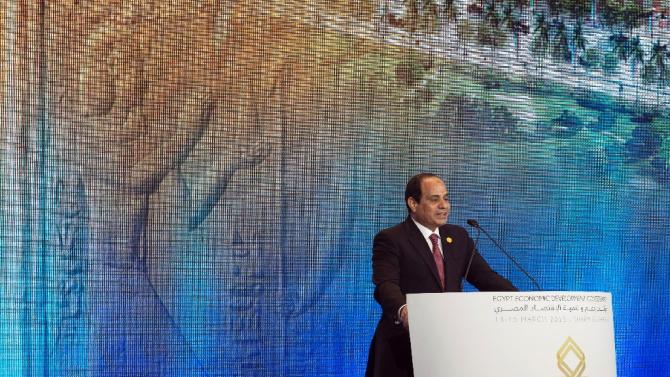At an international level there is a disjunction, what hedescribed this month as “miscommunication” between Cairo and Washington. Egypt’s struggle against the Islamic State of Iraq and Syria is not the latest chapter in some game book for a theoretical “war on terror” that is subject to whims and political necessities like shifting winds blowing across Washington.
It took the public beheading of a U.S. journalist to shake the Americans into action against the ongoing murderous rampage in Iraq, and the scandalous collapse of the corrupt andsectarian Iraqi army before Washington abandoned Nuri al-Malaki, who was responsible as defense minister and prime minster for corruption and sectarianism.
What will it take in Libya? The beheading of 21 Egyptians is obviously not enough, even though ISIS made clear that it killed them specifically because they were Christian, and that this was an opening salvo across the Mediterranean, “against Rome” as a metaphor for Christianity – a salvo aimed at the West.
For Egypt, ISIS affiliates maneuver along its borders from sanctuaries in Gaza and Libya. In portions of Sinai adjacent to Gaza, a jihadist insurgency has been simmering for several years, but only going beyond sporadic attacks to full-fledged assaults against the army and police from the moment the Muslim Brotherhood’s Mohammad Mursi was deposed from the presidency by popular will and military intervention.
To the north, assaults by ISIS affiliates crossing the border to hit isolated Egyptian units have been very rare but very deadly. However, from Egypt’s viewpoint the most recent and vicious ISIS attack took place on that blood-soaked Libyan shoreline.
International inaction
Yet when Cairo went to the U.N. Security Council, first to callfor an international coalition to militarily confront ISIS in Libya, a majority on the Council – which generally is responsive to U.S. concerns – declined to act. Egypt then pressed the Council to lift its arms embargo on the Libyan government, an embargo put in place in 2011 when “the Libyan government” meant Muammar Qaddafi. Again, the Council declined.
The answer, by American spokesmen and echoed by British officials, is that first – before the provision of arms, not to mention any armed intervention – there must be a unity government between the elected and internationally-recognized Libyan government in Tobruk, and the rival rump government dominated by the Libyan Muslim Brotherhood, whose militia allies took up arms when the Brotherhood did poorly in parliamentary elections and drove both the newly-elected House of Representatives and the minsters it had selected to rule out of the capital.
This has been the Anglo-American mantra concerning Libya whenever fighting escalates. The U.S. administration has even chastised Egypt for its occasional air-force interventions.
Then in the weeks leading up to the Sharm conference, a new pattern of urban terrorist activity took place. Instead of occasional but deadly attacks against police and army personnel at isolated checkpoints, there have been low-level bombings almost daily, targeting foreign and Egyptian-owned businesses in Cairo and Alexandria.
Conference success
 There was a clear political logic to these attacks: to undermine the confidence of the many potential foreign investors invited by Egypt to the highly-publicized conference. The authoritiesare certain that this campaign was carried out by the Brotherhood. What is certain is that it did not work.
There was a clear political logic to these attacks: to undermine the confidence of the many potential foreign investors invited by Egypt to the highly-publicized conference. The authoritiesare certain that this campaign was carried out by the Brotherhood. What is certain is that it did not work.
Some 2,000 delegates attended, including heads of state, princes, high-ranking officials, CEOs of powerful regional andglobal companies, bankers and economists. Considering the presence of Jordan’s King Abdullah, the emir of Kuwait, the king of Bahrain, the crown prince of Saudi Arabia, the ruler of Dubai and the prime minister of the United Arab Emirates – not to mention the managing director of the International Monetary Fund, and the director the World Bank – one would have thought that at least U.S. Vice President Joe Biden, if not President Barack Obama, would have made an appearance, however brief. No, it would be Secretary of State John Kerry who put in a sympathetic appearance.
What these big-time investors recognized is that after four years of turmoil, Egypt’s prospectsareexcellent,andthe country is led by a thoughtful visionary
Abdallah Schleifer
The most towering investments were in the energy sector: British Petroleum to invest $12 billion developing gas fields in the Nile Delta and a U.S. firm to build a power plant in the Delta worth $1 billion. Returns on their investments are guaranteed by contracts with the Electricity Ministry to purchase electricity.
Along with investment deals that totaled up to $36.2 billion, andconstruction projects worth $18.6 billion plus $5 billion in loans, Saudi Arabia, the UAE and Kuwait announced direct grants of $4 billion each to provide funds urgently needed by the Egyptian government. In all, more than $70 billion were signed off as investments, construction projects, grants and loans, with another $90 million pledged in memos of understanding, the government announced.
Generating excitement and confidence was a series of announcements, such as a new investment law to radically cut red tape, a significant tax reduction on both corporate andindividual income, and a new Egyptian capital. What these big-time investors recognized is that after four years of turmoil, Egypt’s prospects are excellent, and the country is led by a thoughtful visionary.
___________________________
 Abdallah Schleifer is a veteran American journalist covering the Middle East and professor emeritus at the American University in Cairo where he founded as served as first director of the Kamal Adham Center for TV and Digital Journalism. He is chief editor of the annual publication The Muslim 500; a senior fellow at the Foreign Policy Research Institute (USA) and at the Royal Aal al Bayt Academy for Islamic Thought (Jordan.) Schleifer has served as Al Arabiya Washington D.C. bureau chief; NBC News Cairo bureau chief; Middle East correspondent for Jeune Afrique; as special correspondent (stringer) , New York Timesand managing editor of the Jerusalem Star/Palestine News in then Jordanian Arab Jerusalem.
Abdallah Schleifer is a veteran American journalist covering the Middle East and professor emeritus at the American University in Cairo where he founded as served as first director of the Kamal Adham Center for TV and Digital Journalism. He is chief editor of the annual publication The Muslim 500; a senior fellow at the Foreign Policy Research Institute (USA) and at the Royal Aal al Bayt Academy for Islamic Thought (Jordan.) Schleifer has served as Al Arabiya Washington D.C. bureau chief; NBC News Cairo bureau chief; Middle East correspondent for Jeune Afrique; as special correspondent (stringer) , New York Timesand managing editor of the Jerusalem Star/Palestine News in then Jordanian Arab Jerusalem.
























 The stunning success of Egypt’s three-day economic conference in Sharm al-Sheikh could not have come at a better time, for the weeks prior had been difficult for President Abdel Fattah al-Sisi.
The stunning success of Egypt’s three-day economic conference in Sharm al-Sheikh could not have come at a better time, for the weeks prior had been difficult for President Abdel Fattah al-Sisi.





